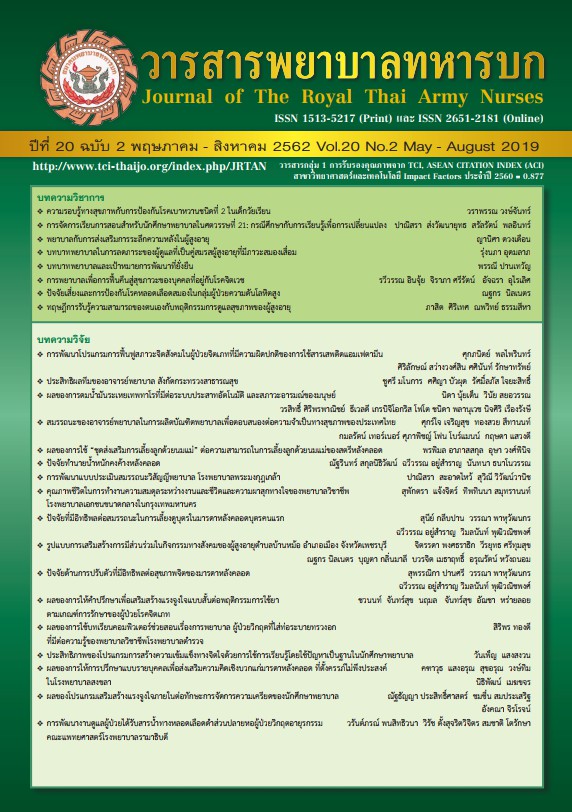An Evaluation of the Bachelor Science in Nursing Curriculum (Revised. B.E. 2555) of The Royal Thai Army Nursing College
Keywords:
Curriculum Evaluation, Bachelor of Nursing Science CurriculumAbstract
The purpose of this descriptive research is to evaluate the Bachelor of Nursing Science Curriculum (Revised, B.E. 2555) of the Royal Thai Army Nursing College in terms of context, input, process, and product, based on the CIPP Model. There are 376 participants in this study, including 51 administrators and teaching staffs, 240 nursing students, 35 teaching support personnel, and 50 professional nurses. The tools of the study were the questionnaires for assessment of the Bachelor of Nursing Curriculum in terms of context, input, process, and product. The content validity of the tools was evaluated by 5 experts which IOC > 0.5.
Furthermore, descriptive statistics comprising of percentage calculation, arithmetic mean, and standard deviation were used to analyze the data. The research findings were: The philosophy of the curriculum was apparently consistent with the objectives of the curriculum. The objectives of the curriculum were paralleled with the social change and needs. The amount of credits of the curriculum structure was high. The amount of the credits of the teaching-learning arrangement in each subject of the curriculum, the teaching staffs’ competencies, and the sufficiency of the supporting factors were highly appropriate. The teaching-learning arrangement was evaluated at the highest level. Furthermore, the curriculum administration was evaluated at high level. The learning achievement of the second, third, and fourth year students were evaluated at moderate level. The opinions of the administrators and teaching staffs, the professional nurses, and the second, third, and fourth year nursing students themselves toward the nursing students’ personal characteristics were evaluated at high level. The results of this study could be a baseline information to improve and develop nursing curriculum.
Downloads
References
Office of the Higher Education Commission. (2009). National Higher Education Qualifications Framework 2009. Bangkok: Office of the Higher Education Commission. (in Thai)
Royal Thai Army Nursing College. The Bachelor Science in Nursing Curriculum. 2012 (Revised. B.E. 2555) of the Royal Thai Army Nursing College. Bangkok. (in Thai)
Patphon, M. Curriculum evaluation for learning and development. 2nd ed., Bangkok: Charan Sanitwong, printing. 2015 (in Thai)
Kanjanawasi, S. Curriculum evaluation: principles and practices. [Electronic data]. Bangkok: Chulalongkorn University. 2010.
Stufflebeam. D.L. editor. Educational Evaluation and Decision-Making. In Education Evaluation Theory and Practice. 1998. Belmont California: Wadsworth Publishing.
Tyler. R.W. Basic Principles of Curriculum and Instruction. 1969. Chicago: University of Press.
Chidnayee, S., Udomlert, M., and Supsung, A. Curriculum Evaluation of Bachelor Degree in Nursing Science Program. (Revised. B.E. 2557), 2014. Boromarajonani College of Nursing, Uttaradit. Boromarajonani College of Nursing, Uttaradit Journal. 6 (1): 77 - 91. (in Thai)
Rujkorakarn, D. Guidelines for curriculum development according to undergraduate standards Nursing Branch. 2010. Bangkok: Nursing Council. (in Thai)
Ritudom, B. An Evaluation of the Bachelor of Nursing Science Curriculum (Revised curriculum, 2012), Royal Thai Air Force Nursing College. Journal of the Royal Thai Army Nurses. 2017. 18 (2), 203 - 211. (in Thai)
Government Gazette Ministry of Education Announcement on the Standard Curriculum of Graduate Studies. 2015. Book 132, Special Episode 259 D.E. (in Thai)
Saraketrin A., Rongmuang D., Chantra R. Nursing Education in the 21st Century: Competencies and Roles of Nursing Instructors. Journal of The Royal Thai Army Nurses. 2019.20(1):12-20 (in Thai)
Onsri P. An Instructional Model for Enhancing 21st-Century Learning Skills among Army Nursing Students. Journal of The Royal Thai Army Nurses. 2018.19(3):147-157 (in Thai)
Downloads
Published
How to Cite
Issue
Section
License
บทความหรือข้อคิดเห็นใดใดที่ปรากฏในวารสารพยาบาลทหารบกเป็นวรรณกรรมของผู้เขียน ซึ่งบรรณาธิการหรือสมาคมพยาบาลทหารบก ไม่จำเป็นต้องเห็นด้วย
บทความที่ได้รับการตีพิมพ์เป็นลิขสิทธิ์ของวารสารพยาบาลทหารบก
The ideas and opinions expressed in the Journal of The Royal Thai Army Nurses are those of the authors and not necessarily those
of the editor or Royal Thai Army Nurses Association.






